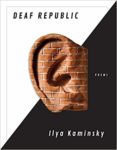As early as the Dramatis Personae (the list of characters included at the beginning to help us keep track), it is clear there will be trouble. For instance, in their entry, it is noted that the Soldiers have arrived in Vasenka “‘to protect our freedom,’ speaking a language no one understands.” If it has to be spelled out, it seems, it may not be freedom they are there to protect. Add to that, the sign language used by the townspeople to refer to the Soldiers is a “finger like a beak pecks one eye.” If the “protecting freedom” part were not convincing for you, let’s consider whether the image of one’s eye being pecked should reasonably be construed as a good thing.
In sensing the trouble to come, we are not wrong. So yes, there will be trouble in the poems of Deaf Republic, poet Ilya Kaminsky’s second collection. Plenty of trouble, starting in the very first poem, “Gunshot,” where, in defiance of the soldiers’ prohibition on public assembly, the townspeople have gathered for, of all things, a puppet show. The puppet show, put on by Alfonso and Sonya, parodies the soldiers until the soldiers themselves show up and order the crowd to “Disperse immediately!”
The puppet show continues, briefly, to the delight of a young boy in the front, Petya, who is the cousin of puppeteer Sonya. Petya is deaf. And while it seems his deafness, and perhaps his youth, prevent him from understanding what is happening and from hearing the the dispersal order, his response seems to suggest he understands both, at a very deep level.
Everyone freezes except Petya, who keeps giggling. Someone claps a hand over
his mouth. The Sergeant turns toward the boy, raising his finger.
You!
You! the puppet raises a finger.
Sonia watches her puppet, the puppet watches the Sergeant, the Sergeant watches Sonya and Alfonso, but the rest of us watch Petya lean back, gather all the spit in his throat, and launch it at the Sergeant.
Petya’s youthful defiance is, perhaps simultaneously the most hopeful moment of the story, and the most devastating. Which is to say, it is one of the most devastating moments. For while there is little hope in Vasenka, there will be more devastations.
The narrative poem is not explicit as to what happens next. The inference—there’s that devastation again—is clear. The poem ends with this wrenching line:
The sound we do not hear lifts the gulls off the water.
***
Petya remains lying in the street for some time. The townspeople protect his small body, first with Sonya curling on the pavement beside him, and later with the crowd circling three rings deep around him. Eventually, the soldiers take him away. But young Petya, and the sound they did not hear, have inspired a new kind of resistance. We learn in “Deafness, an Insurgency, Begins” that the people have also gone deaf.
Our country woke up next morning and refused to hear soldiers.
In the name of Petya, we refuse.
At six a.m., when soldiers compliment girls in the alleyway, the girls slide by, pointing to their ears. At eight, the bakery door is shut in soldier Ivanoff’s face though he’s their best customer. At ten, Momma Galya chalks NO ONE HEARS YOU on the gates of the soldier’s barracks.
Deafness earns them no special privileges, however. In fact, it ushers in a whole new devastation, as the poem suggests: “By eleven a.m., arrests begin.” Despite the reprisals from the soldiers, the silence cements their resilience. “Our hearing doesn’t weaken, but something silent in us strengthens.”
And so it goes, horror upon horror. Children are murdered. Dissidents are arrested and executed. Families are starved. Humans are crushed. The people remain silent, teaching each other sign language so they can speak without being heard. And in the moments between the birth of Sonya and Alfonso’s tiny baby, Anushka, and Sonya’s arrest shortly thereafter, the poet thinks to write down in “A Cigarette,”
Watch—
Vasenka citizens do not know they are evidence of happiness.
***
Happiness. Such a strange concept amidst these piling-on devastations. The word itself looks strange on the page so full of dismal gray images.
Before the first act ends, Alfonso will avenge his wife and will be arrested and executed himself. A poem that seems to come from the townspeople, “Eulogy,” remembers him as the one that asked them to look further on. Their neighbor, Alfonso, reminded them:
We must speak not only of great devastation—
and he played that accordion out of tune in a country
where the only musical instrument is the door.
Before he was arrested, before he was killed, before his puppet dangled lifelessly from his hand, Alfonso made a final attempt to hold on to their humanity all the while he felt it slipping away. In “A Widower,” the poet writes:
Alfonso Barabinski, a child in his arms, spray-paints on the sea wall:
PEOPLE LIVE HERE—
like an illiterate
signing a document
he does not understand.
Somehow, in the midst of his losses, his endless grief, Alfonso saw a glimpse of something more than his great devastation, even if it remained just out of reach, like something he could not yet understand.
Deaf Republic Book Club
We’re reading Ilya Kaminsky’s Deaf Republic together this month. Are you reading along? Share your thoughts on these difficult but poignant poems with us in the comments.
March 11: Act 1
March 18: Act 2
To learn more about this collection, read Glynn Young’s review of Deaf Republic.
Get inbox book club delivery
Our book club discussions are a patron perk. $5 patrons can opt to get each book club edition delivered in full straight to their inboxes, with a photo and link to the discussion!
Photo by akunamatata, Creative Commons license via Flickr. Post by Will Willingham.
- Earth Song Poem Featured on The Slowdown!—Birds in Home Depot - February 7, 2023
- The Rapping in the Attic—Happy Holidays Fun Video! - December 21, 2022
- Video: Earth Song: A Nature Poems Experience—Enchanting! - December 6, 2022



Maureen says
I am hoping this gets made into a play, though its power on the page is arresting. The language is tightly written and controlled, the characterizations are sharp, and the take-away images – like that from the line you quote at the top of your piece – sometimes bring me to a complete stop. It all makes for compulsive reading.
I think, too, that this is a profoundly political work.
Kaminsky is a marvelous poet; ‘Deaf Republic’ well deserves the praise it’s received.
Will Willingham says
Maureen, this story as a play would be … devastating. (In all the best ways.) The images, the lines, yes, all so potent and exquisitely done. I am left with so many conflicted emotions when I read these poems (which, I admit, it is both hard to do and hard to stop doing).
Maureen says
I feel similarly about wanting to stop and not being able to. It’s a book that makes for compulsive reading.
Its messages about voice, using it and not using it, when, and for what reasons call for some deep thinking.